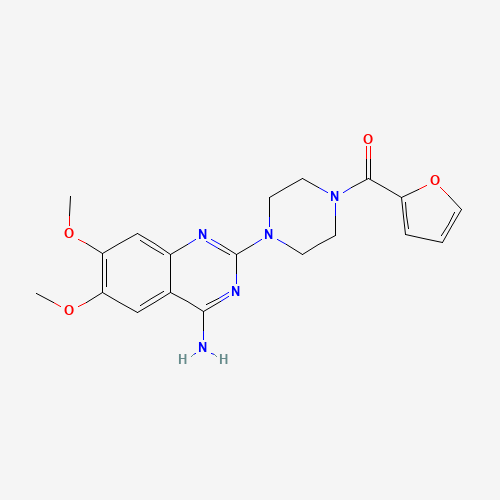| Pharmaceutical Information |
| Drug Name |
Prazosin |
| Drug ID |
BADD_D01827 |
| Description |
Prazosin, also known as _Minipress_, is a drug used to treat hypertension. Prazosin is marketed by _Pfizer_ and was initially approved by the FDA in 1988 [L5828]. It belongs to the class of drugs known as alpha-1 antagonists [FDA label], [A176630].
Recently, many studies have evaluated the benefits of this drug in controlling the symptoms of post-traumatic stress disorder (PTSD) and associated nightmares [A176618, A176621, A176624]. |
| Indications and Usage |
This drug is indicated for the treatment of hypertension (high blood pressure). Prazosin can be given alone or given with other blood pressure-lowering drugs, including diuretics or beta-adrenergic blocking agents [FDA label].
Prazosin does not negatively impact lung function, and therefore may be used to manage hypertension in patients who are asthmatic or patients with chronic obstructive lung disease (COPD)[A176630]. |
| Marketing Status |
approved |
| ATC Code |
C02CA01 |
| DrugBank ID |
DB00457
|
| KEGG ID |
D08411
|
| MeSH ID |
D011224
|
| PubChem ID |
4893
|
| TTD Drug ID |
D0WV3U
|
| NDC Product Code |
Not Available |
| UNII |
XM03YJ541D
|
| Synonyms |
Prazosin | Furazosin | Prazosin Hydrochloride | Hydrochloride, Prazosin | Prazosin HCL | HCL, Prazosin | Minipress | Pratsiol |
|
| Chemical Information |
| Molecular Formula |
C19H21N5O4 |
| CAS Registry Number |
19216-56-9 |
| SMILES |
COC1=C(C=C2C(=C1)C(=NC(=N2)N3CCN(CC3)C(=O)C4=CC=CO4)N)OC |
| Chemical Structure |

|
|
| ADRs Induced by Drug |
|
|
*The priority for ADR severity classification is based on FAERS assessment, followed by the most severe level in CTCAE rating. If neither is available, it will be displayed as 'Not available'.
**The 'Not Available' level is hidden by default and can be restored by clicking on the legend twice..
|
|
|

